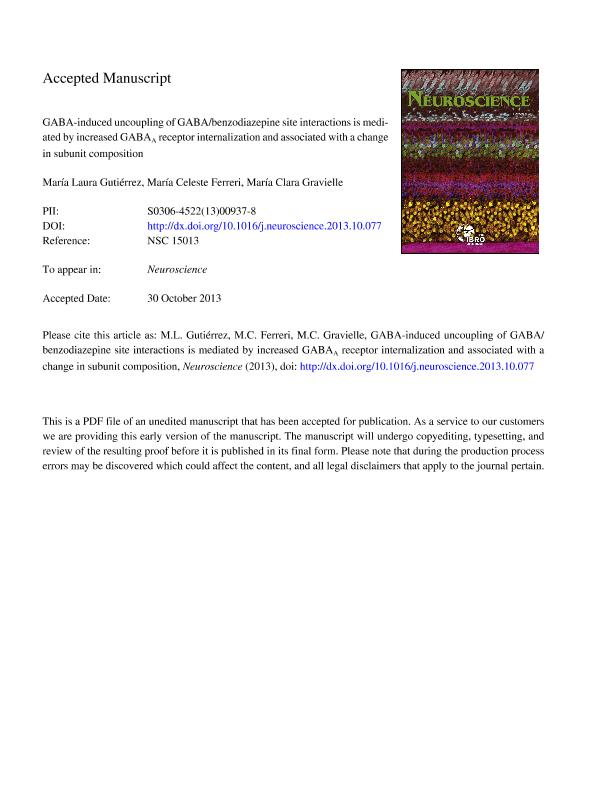Mostrar el registro sencillo del ítem
dc.contributor.author
Gutiérrez, María Laura

dc.contributor.author
Ferreri, Maria Celeste

dc.contributor.author
Gravielle, Maria Clara

dc.date.available
2017-03-07T15:08:37Z
dc.date.issued
2014-01
dc.identifier.citation
Gutiérrez, María Laura; Ferreri, Maria Celeste; Gravielle, Maria Clara; GABA-induced uncoupling of GABA/benzodiazepine site interactions is mediated by increased GABAA receptor internalization and associated with a change in subunit composition; Elsevier; Neuroscience; 257; 1-2014; 119-129
dc.identifier.issn
0306-4522
dc.identifier.uri
http://hdl.handle.net/11336/13594
dc.description.abstract
Persistent activation of GABAA receptors triggers compensatory changes in receptor function that are relevant to physiological, pathological and pharmacological conditions. Chronic treatment of cultured neurons with GABA for 48 h has been shown to produce a down-regulation of receptor number and an uncoupling of GABA/benzodiazepine site interactions with a half-time of 24–25 h. Down-regulation is the result of a transcriptional repression of GABAA receptor subunit genes and depends on activation of L-type voltage-gated calcium channels. The mechanism of this uncoupling is currently unknown. We have previously demonstrated that a single brief exposure of rat primary neocortical cultures to GABA for 5–10 min (t½ = 3 min) initiates a process that results in uncoupling hours later (t½ = 12 h) without a change in receptor number. Uncoupling is contingent upon GABAA receptor activation and independent of voltage-gated calcium influx. This process is accompanied by a selective decrease in subunit mRNA levels. Here, we report that the brief GABA exposure induces a decrease in the percentage of α3-containing receptors, a receptor subtype that exhibits a high degree of coupling between GABA and benzodiazepine binding sites. Initiation of GABA-induced uncoupling is prevented by co-incubation of GABA with high concentrations of sucrose suggesting that it is dependent on a receptor internalization step. Moreover, results from immunocytochemical and biochemical experiments indicate that GABA exposure causes an increase in GABAA receptor endocytosis. Together, these data suggest that the uncoupling mechanism involves an initial increase in receptor internalization followed by activation of a signaling cascade that leads to selective changes in receptor subunit levels. These changes might result in the assembly of receptors with altered subunit compositions that display a lower degree of coupling between GABA and benzodiazepine sites. Uncoupling might represent a homeostatic mechanism that negatively regulates GABAergic transmission under physiological conditions in which synaptic GABAA receptors are transiently activated for several minutes.
dc.format
application/pdf
dc.language.iso
eng
dc.publisher
Elsevier

dc.rights
info:eu-repo/semantics/openAccess
dc.rights.uri
https://creativecommons.org/licenses/by-nc-nd/2.5/ar/
dc.subject
Gabaa Receptors
dc.subject
Gaba
dc.subject
Benzodiazepine
dc.subject
Uncoupling
dc.subject
Endocytosis
dc.subject.classification
Neurociencias

dc.subject.classification
Medicina Básica

dc.subject.classification
CIENCIAS MÉDICAS Y DE LA SALUD

dc.title
GABA-induced uncoupling of GABA/benzodiazepine site interactions is mediated by increased GABAA receptor internalization and associated with a change in subunit composition
dc.type
info:eu-repo/semantics/article
dc.type
info:ar-repo/semantics/artículo
dc.type
info:eu-repo/semantics/publishedVersion
dc.date.updated
2017-03-06T18:06:52Z
dc.journal.volume
257
dc.journal.pagination
119-129
dc.journal.pais
Países Bajos

dc.journal.ciudad
Ámsterdam
dc.description.fil
Fil: Gutiérrez, María Laura. Consejo Nacional de Investigaciones Científicas y Técnicas. Oficina de Coordinación Administrativa Houssay. Instituto de Investigaciones Farmacológicas (i); Argentina. Universidad de Buenos Aires; Argentina
dc.description.fil
Fil: Ferreri, Maria Celeste. Consejo Nacional de Investigaciones Científicas y Técnicas. Oficina de Coordinación Administrativa Houssay. Instituto de Investigaciones Farmacológicas (i); Argentina. Universidad de Buenos Aires; Argentina
dc.description.fil
Fil: Gravielle, Maria Clara. Consejo Nacional de Investigaciones Científicas y Técnicas. Oficina de Coordinación Administrativa Houssay. Instituto de Investigaciones Farmacológicas (i); Argentina. Universidad de Buenos Aires; Argentina
dc.journal.title
Neuroscience

dc.relation.alternativeid
info:eu-repo/semantics/altIdentifier/url/http://www.sciencedirect.com/science/article/pii/S0306452213009378
dc.relation.alternativeid
info:eu-repo/semantics/altIdentifier/url/http://dx.doi.org/10.1016/j.neuroscience.2013.10.077
Archivos asociados
